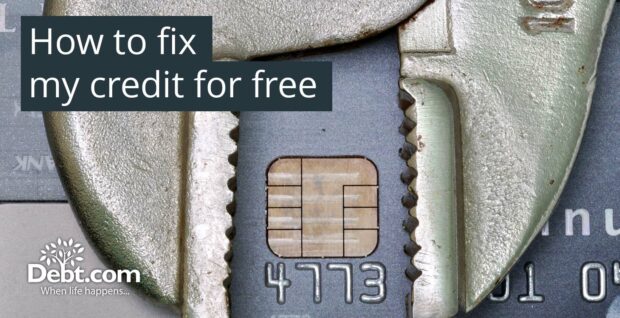
Bad credit can drag you down. It makes it harder to qualify for loans, credit cards, and even housing. It can also lead to higher interest rates, impacting the overall cost of borrowing, and may even affect your job prospects. Fortunately, bad credit isn’t a life sentence. You can take steps to repair your credit and rebuild your financial future. We’ll explore do-it-yourself credit repair strategies, discuss credit repair companies, and highlight other valuable resources to help you on your path to better credit health.
Table of Contents
Is it hard to repair bad credit?
No, it is not hard to repair bad credit. It’s possible with dedication, persistence, and adopting sensible financial practices, even though it does not happen immediately. It involves deliberate efforts to implement behaviors like regularly paying off credit card debt, challenging errors on credit reports, and using effective debt repayment strategies. Understanding your credit score and reporting in detail is essential to the process since it helps to pinpoint problem areas and monitor the advancement.
Understanding your credit score
The first step to fixing your credit score is understanding what it is, and what affects it. Your credit score is a three-digit number between 300 and 850 that is calculated using the information in your credit report. This report summarizes your credit history and borrowing behavior, including your payment history (on-time, late, or missed payments), credit utilization ratio (the amount of available credit you’re using), total amounts owed, length of your credit history, any new credit accounts, your credit mix (the types of credit you hold), public records (like bankruptcies or liens), and credit inquiries. While different scoring models, like FICO and VantageScore, use this information, they may weigh these factors slightly differently. This means your score might vary slightly depending on which model is used.
What impacts your credit score
Several factors can significantly impact your credit score, both positively and negatively. Positive influences include consistently paying your bills on time, keeping your credit utilization low (ideally below 30% of your available credit), and maintaining a mix of different credit types (like credit cards and installment loans). A long credit history also generally helps, as it demonstrates responsible credit management over time. On the other hand, negative impacts include missed or late payments, high credit utilization (maxing out credit cards), applying for too much credit in a short period, and derogatory marks like bankruptcies, foreclosures, or collections. Even seemingly small things, like forgetting a payment or having a high balance on a single card, can negatively affect your score.
What is Credit Repair ?
Credit repair, also known as credit restoration, is the process of improving a poor credit score. Because each person’s credit history is unique, the specific steps involved can vary. However, credit repair generally falls into three main categories: correcting errors on your credit report, disputing negative items, and taking positive actions to improve your credit score. While the impact and timeline for improvement can differ, this three-pronged approach is the foundation for sustainable, long-term credit health.
Who can help me to fix my credit?
There are several repair assistance and services that can help you fix your credit. You can do it yourself, use credit repair software, or hire help from a credit repair company, credit counseling agencies, consumer protection lawyers, financial advisors or planners, or use a non-profit debt relief service.
Do-it-yourself credit repair
Improving your credit yourself is entirely possible and free. It does, however, take time, effort, and attention to detail. Here are the steps you can take yourself to repair your credit.
Find and fix errors on your credit report
The first thing you want to do is check your credit reports for errors that may be bringing your credit score down. Here’s a step by step guide:
Step 1: Get a copy of your credit reports
You can get a copy of your credit reports for free annually at annualcreditreport.com. It’s a good idea to pull all three reports from three major credit bureaus (Experian, Equifax, and TransUnion) to get a complete picture of your credit history. After verifying your identity, you can download your reports.
Step 2: Review Your Reports
Carefully review each report for errors. Focus on negative items, but also check for inaccuracies in personal information (name variations, Social Security number, addresses), payment history (missed payments reported incorrectly), inaccurate balances or outdated account statuses, negative items that should have expired (bankruptcies, foreclosures), unauthorized hard credit inquiries, and duplicate accounts. Make a list of any discrepancies you find.
Step 3: Dispute Errors
Disputing errors is the most crucial and often most time-consuming part of DIY credit repair. This involves writing to each credit bureau individually, explaining the error clearly and concisely, and including copies of supporting documentation (keep the originals for yourself). You can find dispute letter templates here.
Here are the site for disputing at each bureau:
The bureau then has 30 days to investigate. If the item can’t be verified, it must be removed, and you’ll receive a free copy of your report confirming the change. You can also request the bureau notify anyone who inquired about your credit in the past six months, and even employers who checked your report within the past two years.
If a dispute is unsuccessful, you can add a 100-word consumer statement to your file, though its effectiveness is limited. In some cases, consulting a consumer law attorney or contacting the FTC might be necessary
Step 4: Repeat
If you find multiple errors, it’s often best to dispute them in batches (a maximum of five per letter is recommended), and remember to dispute the same error with each bureau individually, as they don’t automatically share corrections. Maintain a log of your disputes and all related correspondence. Regularly repeating this process, especially if you initially find many errors, is key to effectively repairing your credit.
Pay bills on time
Making on-time payments is the single most influential factor in determining your credit score. Each on-time payment, whether for credit cards, loans, or other debts, contributes positively to your payment history. A consistent record of timely payments over time demonstrates responsible credit management and is highly valued by lenders. While one on-time payment may not dramatically increase your score, even a single missed or late payment can significantly and negatively impact it.
Lower your credit utilization ratio
Credit utilization, the percentage of your available credit that you’re using, plays a significant role in your credit score (accounting for 30% of your FICO score and 20% of your VantageScore). It’s calculated by dividing your current balance by your credit limit and multiplying by 100. For instance, a $200 balance on a $1,000 credit limit results in a 20% utilization ratio. Keeping this ratio below 30% is ideal, and lower is even better.
The most effective way to reduce your credit utilization is to pay down your balances. If that’s not feasible, consider talking to a credit counselor. They can guide you on debt relief options like debt consolidation which reduces high-interest debts, like credit card balances, into a single loan with a lower interest rate. This can potentially decrease your overall credit utilization.
Deal with collections accounts
Collections on your credit report require prompt attention. If you find a collection account, contact the collection agency immediately to discuss options like payment plans or settlement offers. While paying off a collection can improve your credit score, be aware that settling a debt for less than the full amount can initially have a negative impact. However, the positive effects of paying off the debt, even a settled debt, will contribute to rebuilding your credit over time.
Consider professional help
If you’re feeling overwhelmed, credit counseling can help. They can help you manage your debt, discuss debt relief options (like a debt management plan or consolidation), and help you develop a realistic budget.
Credit repair services
Credit repair services offer assistance to individuals seeking to improve their credit standing by addressing inaccuracies and negative items on their credit reports. These services can range from simple credit report analysis to more complex debt negotiation strategies. While some people successfully manage credit repair on their own, others find value in the guidance and expertise of professional services. However, the credit repair industry has unfortunately earned a mixed reputation due to the presence of some bad actors. It’s crucial to understand what legitimate credit repair companies can and cannot do, and to carefully vet any company before engaging their services.
How do credit repair services work?
Legitimate credit repair companies operate by identifying and disputing inaccurate or outdated information on your credit reports. They cannot, however, remove accurate negative information. No company can legally erase legitimate debts or magically fix a poor credit history. If a company promises to do so, it’s a major red flag.
Reputable credit repair companies typically provide a range of services for consumers including:
Credit report analysis and dispute filing
The main thing credit repair companies do is analyze your credit reports from Equifax, Experian, and TransUnion. The service provider meticulously reviews these reports, identifying potential errors such as incorrect personal details, accounts that don’t belong to you, inaccurate late payments or collections, and outdated negative information. Once these inaccuracies are identified, the company files disputes with the relevant credit bureaus, often including supporting documentation to substantiate the claims. They then follow up with the bureaus to ensure timely investigation and corrections.
Goodwill letters
Beyond disputing inaccuracies, some credit repair services employ goodwill letters. This proactive approach involves writing to creditors or collection agencies to request adjustments to your credit report, such as the removal of late payment notations. While success isn’t guaranteed, successful goodwill letters can positively impact a client’s credit history.
Credit monitoring
Many companies offer ongoing credit monitoring as part of their services. This feature alerts you to any new negative items that appear on your credit report, allowing you to address them promptly and prevent further damage to your credit score. It’s crucial to remember that while credit repair companies can dispute inaccuracies, they cannot remove accurate negative information. They can help you correct errors, but they can’t magically erase legitimate debts or negative marks.
Debt negotiation and settlement
For clients with outstanding debts, some credit repair services offer negotiation and settlement services. They can negotiate with creditors on your behalf to potentially settle debts for less than the total amount owed. While debt settlement can provide debt relief, it’s important to be aware that it is also considered a negative mark on your credit report and can temporarily lower your credit score.
Cease and desist letters
In cases of aggressive or harassing debt collection practices, some credit repair services provide cease and desist letters. These letters formally demand that debt collectors cease communication with the client, offering relief and peace of mind during stressful situations.
Credit score improvement planning
Many credit repair professionals offer personalized credit score improvement plans. These plans are tailored to the client’s specific situation and provide guidance on actions they can take to boost their credit strength and achieve their financial goals.
Educational resources
Reputable credit repair services often provide educational resources and tools to help borrowers better understand and manage their credit, promoting long-term financial success.
How do I find a reputable credit repair service?
When choosing a credit repair service, it’s important to do your homework. A reputable company will provide a clear, written contract outlining the services, fees, and your rights. Honesty about what they can and cannot fix is paramount; avoid companies making unrealistic promises or guaranteeing specific results. The Credit Repair Organizations Act (CROA) generally prohibits upfront payments, so be wary of any company demanding them. Check online reviews, particularly on reputable sites like the Better Business Bureau (BBB), to gauge customer experiences. Be especially cautious of companies claiming they can erase accurate negative information – these are often scams.
When evaluating credit repair services, consider these key factors: the range of services offered, the pricing structure, the process and estimated timeline for credit improvement, and the availability of a money-back guarantee or clear refund policies. Ask about the typical timeframe for seeing results. Check the company’s reputation using online reviews and government resources like the Consumer Financial Protection Bureau (CFPB) and the Federal Trade Commission (FTC) websites. Remember, legitimate credit repair companies focus on disputing inaccuracies and helping you manage your credit responsibly, not offering quick fixes or magic solutions.
What are the regulations for credit repair services?
There are laws and regulations that aim to protect consumers from unfair or deceptive practices by credit repair companies. The regulations for credit repair are:
- Credit Repair Organizations Act (CROA): The federal law forbids deceptive activities and governs credit repair services. Credit repair services must give borrowers a written contract outlining their services, the terms under which they must pay, and their right to cancel. CROA prohibits credit repair businesses from making exaggerated claims about their offerings or offering particular outcomes. Credit repair companies must follow specific criteria while dealing with customers and offering services. They have to ensure that their operations are transparent and that their services are well explained.
- Fair Credit Reporting Act (FCRA): The FCRA governs the gathering, disseminating, and applying credit data about borrowers. It allows customers to challenge false information on their credit reports and mandates that credit reporting agencies look into contested information promptly. Credit repair identifies and disputes inaccuracies on credit reports under the FCRA. Credit repair businesses must ensure that all disputes are resolved correctly and swiftly and abide by FCRA criteria when contesting issues on behalf of their borrowers.
- Fair Debt Collection Practices Act (FDCPA): The FDCPA forbids abusive, dishonest, and unjust debt collection techniques and controls the conduct of debt collectors. It permits customers to contest debts and mandates that debt collectors furnish specific details, including the debt’s total amount and the original creditor’s identity. Debt collector settlement negotiations or contesting collection accounts are imperative for credit repair. Credit repair agencies must comply with FDCPA standards when dealing with debt collectors on behalf of their clients and lobbying for the resolution of disputed accounts.
- State Regulations: Federal laws and state regulations govern credit rehabilitation services. These rules vary from state to state, including bonding specifications, license criteria, and bans on particular activities. Credit repair businesses must abide by all relevant laws and regulations, including state-specific regulations. It entails securing licenses, keeping bonds, and abiding by extra rules set down by state authorities.
State Regulations: Federal laws and state regulations govern credit rehabilitation services. These rules vary from state to state, including bonding specifications, license criteria, and bans on particular activities. Credit repair businesses must abide by all relevant laws and regulations, including state-specific regulations. It entails securing licenses, keeping bonds, and abiding by extra rules set down by state authorities.
How much does credit repair services cost?
The cost of credit repair services can vary significantly depending on the company and the specific services offered. It’s best to shop around before committing to one company. Many companies utilize a monthly fee structure, which typically ranges from $50 to $150, with the total cost depending on the duration of service. Some companies also charge a one-time setup or enrollment fee, which can range from $50 to $200 or more. Package deals, bundling various services at different price points, are another common pricing model, with higher tiers generally offering more comprehensive assistance. Several factors influence the overall cost, including the range of services required (e.g., credit report analysis, dispute filing, debt negotiation), the reputation and size of the credit repair company, and the length of time needed to address the consumer’s credit issues.
What percentage can a credit repair service increase my credit score?
Credit repair companies can’t guarantee a specific credit score increase, and promising one is illegal. Credit scores are complex, and many factors influencing them are beyond a credit repair service’s control. While they can dispute inaccuracies (potentially raising your score) and offer credit management advice, they can’t remove accurate negative information. Therefore, any score improvement depends entirely on the specific issues on your report. Disputing multiple errors might lead to a noticeable increase, but if your report is accurate, the impact will be minimal.
Other credit repair help
Beyond DIY credit repair and full-service credit repair companies, several other avenues can help you improve your credit.
Credit repair software
Credit repair software automates key tasks like importing and analyzing credit reports, identifying errors, generating dispute letters, and tracking dispute status. Some programs also offer credit score monitoring and educational resources. While beneficial for organization and potentially cost-effective, results aren’t guaranteed, accuracy depends on user input, and costs vary. Active participation and responsible credit management are still essential.
Credit counseling agencies
These agencies provide financial education and personalized guidance to help you manage debt and improve credit. They may negotiate with creditors to establish repayment plans (like debt management programs, which can positively impact your credit) or debt settlements (which can negatively impact your score). It’s crucial to research and choose a certified agency with a proven track record.
Consumer protection lawyers
Specializing in consumer rights, these lawyers handle legal matters related to credit reporting errors, identity theft, and unfair debt collection. They can advocate for you in disputes with creditors or credit bureaus, potentially leading to the removal of inaccurate information or compensation for damages. However, legal assistance is generally expensive and can be a lengthy process.
Financial advisors/planners
These professionals offer personalized advice on overall financial management, including strategies for improving credit scores. They can help you establish healthy financial habits like prioritizing debt repayment and budgeting, contributing to long-term credit health. Keep in mind that financial advisor services come with fees, and not all advisors specialize in credit repair.
Non-profit debt relief services
These organizations provide counseling and assistance to individuals struggling with debt, offering services like debt management plans and negotiations with creditors to reduce interest rates or fees. They also provide educational resources to promote financial stability. Non-profit status often means a focus on client needs rather than profit. However, thorough research is essential to ensure the legitimacy and reputation of any debt relief service.
How long does credit repair take?
How long credit repair takes depends on a variety of factors, making it difficult to give a single, definitive answer. While some improvements might be seen within a few months, a more realistic timeframe for noticeable progress is typically three to six months, and sometimes longer.
There are several things that can influence your timeline. The severity of the credit issues is a major factor; minor problems like a single late payment might be resolved relatively quickly, while more serious issues like bankruptcy or multiple collections accounts will naturally take much longer to address. The accuracy of the information on your credit report is also crucial. Disputing inaccuracies, even seemingly simple ones, requires gathering documentation and communicating with the credit bureaus, which takes time. Your own participation in the process can also affect things. Providing requested documents promptly, responding to inquiries quickly, and following recommended steps can significantly speed things up, while delays in communication or a lack of follow-through can prolong the process. The responsiveness of the credit bureaus and creditors, the complexity of your specific situation (such as dealing with multiple creditors or complex legal issues), and the need for a customized approach all play a role.
Credit repair requires persistence and patience; it’s a process that takes time and consistent effort. It’s important to have realistic expectations. Progress is often gradual, and rebuilding credit is a marathon, not a sprint.
What are the consequences of illegally fixing credit history for credit repair?
Fixing your credit is not illegal itself; it only becomes illegal when fraudulent or deceptive practices are used. Legitimate credit repair involves reviewing your credit reports for inaccuracies, disputing errors through proper channels, making timely payments, managing credit utilization, and working with reputable credit repair companies that abide by the law.
Illegally attempting to fix your credit history, however, is never a good idea. It’s unethical, dishonest, and, most importantly, illegal. Using false information, like fake Social Security numbers, carries serious legal consequences, including substantial fines and even imprisonment. While the goal might be a quick credit score boost, the risks far outweigh any temporary gain. Such fraudulent activity damages your reputation and can lead to long-term financial and legal problems, including criminal charges like identity theft or fraud, and civil lawsuits from creditors. Illegal actions will ultimately harm your creditworthiness. Stick to legal and ethical methods to build a strong financial foundation.
How to fix your credit after identity theft?
Identity theft, where someone steals your personal information and uses it without your permission, can severely damage your credit. If this happens to you, take these steps immediately to start repairing the damage:
- Contact Affected Companies: Immediately notify all companies where fraudulent charges or accounts have been opened in your name. Whether you’ve been contacted by debt collectors or discovered unauthorized accounts yourself, prompt communication is crucial, as each company has its own procedures for handling these situations.
- Close and Reissue Accounts: Close any unauthorized credit and deposit accounts and request new cards. Notify the issuers of the fraudulent activity and close the compromised accounts immediately to prevent further unauthorized transactions and limit potential financial losses.
- Place a Fraud Alert or Credit Freeze: Contact Experian, Equifax, and TransUnion to place a fraud alert or credit freeze on your credit reports. A fraud alert, typically lasting 90 days (and renewable), requires creditors to take extra steps to verify your identity before opening new accounts. A credit freeze provides even stronger protection by completely restricting access to your credit report, making it nearly impossible for new accounts to be opened in your name. While a freeze can temporarily hinder your own ability to obtain credit, it’s a powerful tool for protecting your credit after identity theft.
- File a Complaint with the FTC: Report the identity theft to the Federal Trade Commission (FTC) online at IdentityTheft.gov or by calling 1-877-ID-THEFT (438-4338). Provide as much detail as possible. The FTC report serves as official documentation of the identity theft, which you’ll need when working with businesses and law enforcement to resolve the issue.
- Dispute Fraudulent Accounts with Credit Bureaus: Obtain copies of your credit reports from each of the three major credit bureaus (Equifax, Experian, and TransUnion) at AnnualCreditReport.com. Carefully review them for any unauthorized accounts and promptly dispute these fraudulent entries with each bureau individually. Providing the FTC report as supporting documentation can strengthen your dispute. Disputing inaccuracies is essential for correcting your credit history and minimizing the long-term impact of identity theft. By acting quickly and systematically, you can begin the process of restoring your credit after identity theft.












